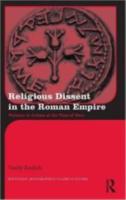
Routledge Monographs (2015) h/b 350pp £100 (ISBN 9780415161060)
As R. says himself in his preface, this is not strictly a history of the Jewish War; it is specifically a discursive exploration of the part probably played by religious dissent in the development of the revolt of AD 66 to 70. One says ‘probably’ because, as R. makes very clear, not only are the sources full of gaps but the main one, Josephus, deliberately plays down or hushes up this aspect so as to appeal more to his Greek and Roman readers. Religious extremism sets its adherents not only against the cultural enemy (Rome) but also against the majority of co-religionists who, for a quiet life, are happy to coexist with the Romans provided they leave them alone to practise their faith, which mostly they do; the fanatics, on the other hand, will murder their own people with as much aplomb as they do the enemy, if they do not think them ‘pure’ enough. Parallels with our own time are obvious, and R. is convincing in arguing that this mindset must have been an important motivator in the Palestinian upheavals in Nero’s day.
The treatment is thorough. In a very lengthy introduction, R. discusses the nature of the religious dissent mindset in a broadly tolerant society like the Roman Empire There is a long first chapter which explains the main strands of Judaism at the time (Sadducees, Pharisees and Essenes) and assesses the historical sources, especially Josephus. In the course of this he gives a valuable counterblast against the extreme forms of postmodernist historical writing (those who would suggest that there is no such thing as a historical truth): Josephus may omit details, invent speeches and select interpretations to put a preferred spin on his narrative, but none of this is any reason to disbelieve him when he states that something happened, especially when one remembers that his first work, the Wars, was written so soon after the events that many readers would have known from their experience whether he was telling the factual truth.
Another long chapter (the third) surveys the period from Rome’s arrival in Palestine under the later Hasmoneans up to the start of the Great Revolt in AD 66. In between, the second chapter summarises the events leading up to the explosion point in that year. Later chapters cover the complex events of 66-70 in more detail, showing, inter alia, the tensions between the rebels and the much greater number of collaborationist Jews, how the rebels frequently fought among themselves, and how a broadly peaceful Roman overlordship was wrecked by the incompetence and/or brutality of specific procurators and governors. There is a chapter on the rise of the zealot movement, and another chapter on the sicarii or ‘dagger men’, and the parts they played in these events. To end, there is a chapter on the destruction of Jerusalem and the final siege at Masada, and a concluding argument.
This is not an easy book to read, mainly because of its discursive style, which often seems to wander about and turn back on itself as it rushes down new alleyways of conjecture. Getting a grip on the history is difficult; a timeline chart would have helped. But the ideas are often intriguing, and repay the effort of following them up. As already noted, they have resonance today. One disturbing suggestion is that modern man has largely lost the idea of the sacred, and is therefore unable to understand what a powerful motivating force it can be, even to self-sacrifice.
There is a full bibliography and index. There are also notes, but unusually the notes do not appear in the published book. At the end of his preface, R. says that his notes were too voluminous to print in the same volume, and therefore the publisher, Routledge, has created a companion website. You have to hunt for the address of this website: it is given only in the publisher’s note on the first page (before the title page); it is in fact the address of the publisher/the ISBN number. From a button called eResources on this page, you can download the zipped file of notes. Perhaps this is the future, but it’s a bit of a palaver!
Colin McDonald
